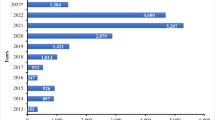Abstract
Kidnap** in Nigeria has taken on a new dimension: It has evolved into a lucrative business—and has become a means of livelihood for some frustrated and evil-minded people. This unlawful act has become so frequent that the world now sees Nigeria as a failing state where people are easily kidnapped for ransom. In fact, kidnap** is being used as an agenda through which to destroy the Nigerian state. It is a silent and orchestrated means of waging war against the country. The implication is that the military must counteract this action. No doubt, this ugly development is not good for Nigeria’s image—neither with the citizenry nor with the outside world in general. Kidnap** is a rape to humanity in the sense that one is abused without recourse to dignity. These abductions are also tantamount to forced migration as the kidnapped are compulsorily moved from one “homeland” to an unknown land without their consent. In criminal law, kidnap** is the unlawful carrying away (asportation) and confinement of a person against their will. Kidnap**, therefore, is a crime against humanity and im**es on a victim’s fundamental human rights of movement and association. Using the basis of kidnap** as a crime against humanity, especially in Nigeria, this chapter is written from a conflict management perspective with the supposition that economic hardship and the quest to get rich fast may actually have been responsible for the series of kidnap**s experienced by Nigeria in recent times. The paper believes the military has a role to play in bringing this menace to a halt.
Access this chapter
Tax calculation will be finalised at checkout
Purchases are for personal use only
Similar content being viewed by others
Notes
- 1.
The people the Athenians passed a degree excluding them from their market as punishment for assisting Athens’ rival enemy, Corinth, in waging was against her (Athens).
References
Adekanye B (1997) Norwegian church aid’s humanitarian and peacemaking work in Mali. Journal of Peace Research. Sage, London
Adeniyi EF (2014) Promoting security and culture of peace through peace education. Peace studies and practice. J Soc Peace Stud Pract 1(3)
Adeyanju D (2006) Pragmatic features of political speeches in English by some prominent Nigerians. In: Ife Studies in English (ISEL), vol. 6(1). Department of English, Obafemi Awolowo University, Ile Ife, pp 48–63
Akanji TA (2018) When labour is the beginning of insecurity. (An inaugural lecture delivered on 30 August, 2018 at Trenchard Hall. University of Ibadan), Ibadan
Akinterinwa BA (2003) International relations and peacebuilding in Africa. A guide to peace education and peace promotion strategies in Africa. In: Haruna HB, Nwolise OBC, Oluyemi-Kusa D (eds) The Nigerian approach, vol 1. African Refugee Foundation (AREF), Lagos
Albert IO (2001) Introduction to third-party intervention in community conflicts. John Archers, Ibadan
Aluko BA (2014) Understanding the essentials of conflict analysis. Peace Studies and Practice. J Soc Peace Stud Pract 1(3)
Aniga US (2004) The role of language in conflict management: President Obasanjo’s language and style as case study. MA thesis submitted to Peace and Conflict Studies, Institute of African Studies, University of Ibadan, Ibadan
Boutros-Ghali B (1992) An agenda for change. United Nations, New York
Diamond L, McDonald J (1996) Multi-track diplomacy. Kumarian, West Hartford.
Galtung J (1969) Essays in peace research, vol. 2: peace, war and defence. Christian Ejiers, Copenhagen
IDASA (2004) Peace practice book 1: tracking conflict. Institute for Democracy in South Africa (IDASA). Nigeria Office, Abuja
Ihejirika S (2001) Conflict management training manual. Abuja
James A (1990) Peace kee** in international politics. Macmillan of International Institute for Strategic Studies, Hampshire, London
Moore CW (1996) The mediation process: practical strategies for conflict. Jossey Bass Publishers, San Francisco
Shell M (2002) American babel collection of essays. Harvard University Press, Cambridge, MA
Author information
Authors and Affiliations
Editor information
Editors and Affiliations
Rights and permissions
Copyright information
© 2022 The Author(s), under exclusive license to Springer Nature Switzerland AG
About this chapter
Cite this chapter
Aniga, U. (2022). Kidnap** as a National Embarrassment in Nigeria and the Military Role in Curbing It. In: Spiegel, E., Mutalemwa, G., Liu, C., Kurtz, L.R. (eds) Peace Studies for Sustainable Development in Africa. Advances in African Economic, Social and Political Development. Springer, Cham. https://doi.org/10.1007/978-3-030-92474-4_14
Download citation
DOI: https://doi.org/10.1007/978-3-030-92474-4_14
Published:
Publisher Name: Springer, Cham
Print ISBN: 978-3-030-92473-7
Online ISBN: 978-3-030-92474-4
eBook Packages: Social SciencesSocial Sciences (R0)




